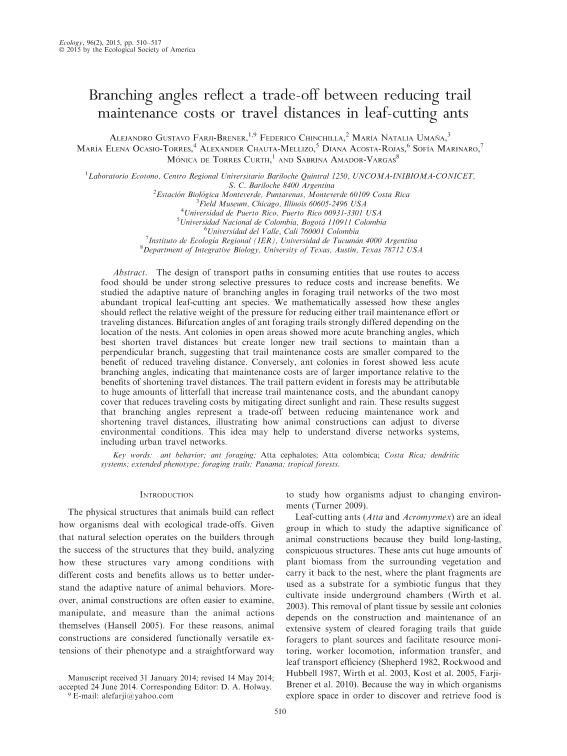Artículo
Branching angles reflect a trade-off between reducing trail maintenance costs or travel distances in leaf-cutting ants
Farji Brener, Alejandro Gustavo ; Chinchilla, Federico; Umaña, Maria Natalia; Ocasio Torres, Maria Elena; Chauta Mellizo, Alexander; Acosta Rojas, Diana; Marinaro Fuentes, María Sofía
; Chinchilla, Federico; Umaña, Maria Natalia; Ocasio Torres, Maria Elena; Chauta Mellizo, Alexander; Acosta Rojas, Diana; Marinaro Fuentes, María Sofía ; de Torres Curth, Monica Irma; Amador Vargas, Sabrina
; de Torres Curth, Monica Irma; Amador Vargas, Sabrina
 ; Chinchilla, Federico; Umaña, Maria Natalia; Ocasio Torres, Maria Elena; Chauta Mellizo, Alexander; Acosta Rojas, Diana; Marinaro Fuentes, María Sofía
; Chinchilla, Federico; Umaña, Maria Natalia; Ocasio Torres, Maria Elena; Chauta Mellizo, Alexander; Acosta Rojas, Diana; Marinaro Fuentes, María Sofía ; de Torres Curth, Monica Irma; Amador Vargas, Sabrina
; de Torres Curth, Monica Irma; Amador Vargas, Sabrina
Fecha de publicación:
02/2015
Editorial:
Ecological Society Of America
Revista:
Ecology
ISSN:
0012-9658
Idioma:
Inglés
Tipo de recurso:
Artículo publicado
Clasificación temática:
Resumen
The design of transport paths in consuming entities that use routes to access food should be under strong selective pressures to reduce costs and increase benefits. We studied the adaptive nature of branching angles in foraging trail networks of the two most abundant tropical leaf-cutting ant species. We mathematically assessed how these angles should reflect the relative weight of the pressure for reducing either trail maintenance effort or traveling distances. Bifurcation angles of ant foraging trails strongly differed depending on the location of the nests. Ant colonies in open areas showed more acute branching angles, which best shorten travel distances but create longer new trail sections to maintain than a perpendicular branch, suggesting that trail maintenance costs are smaller compared to the benefit of reduced traveling distance. Conversely, ant colonies in forest showed less acute branching angles, indicating that maintenance costs are of larger importance relative to the benefits of shortening travel distances. The trail pattern evident in forests may be attributable to huge amounts of litterfall that increase trail maintenance costs, and the abundant canopy cover that reduces traveling costs by mitigating direct sunlight and rain. These results suggest that branching angles represent a trade-off between reducing maintenance work and shortening travel distances, illustrating how animal constructions can adjust to diverse environmental conditions. This idea may help to understand diverse networks systems, including urban travel networks.
Palabras clave:
Ant Behavior
,
Atta Cephalotes
,
Atta Colombica
,
Costa Rica
,
Foraging Trails
Archivos asociados
Licencia
Identificadores
Colecciones
Articulos(INIBIOMA)
Articulos de INST. DE INVEST.EN BIODIVERSIDAD Y MEDIOAMBIENTE
Articulos de INST. DE INVEST.EN BIODIVERSIDAD Y MEDIOAMBIENTE
Citación
Farji Brener, Alejandro Gustavo; Chinchilla, Federico; Umaña, Maria Natalia; Ocasio Torres, Maria Elena; Chauta Mellizo, Alexander; et al.; Branching angles reflect a trade-off between reducing trail maintenance costs or travel distances in leaf-cutting ants; Ecological Society Of America; Ecology; 96; 2; 2-2015; 510–517
Compartir
Altmétricas



